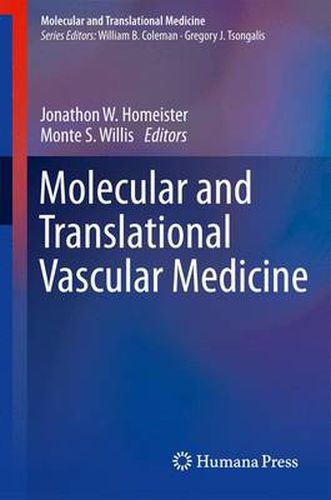Readings Newsletter
Become a Readings Member to make your shopping experience even easier.
Sign in or sign up for free!
You’re not far away from qualifying for FREE standard shipping within Australia
You’ve qualified for FREE standard shipping within Australia
The cart is loading…






This title is printed to order. This book may have been self-published. If so, we cannot guarantee the quality of the content. In the main most books will have gone through the editing process however some may not. We therefore suggest that you be aware of this before ordering this book. If in doubt check either the author or publisher’s details as we are unable to accept any returns unless they are faulty. Please contact us if you have any questions.
Molecular and Translational Vascular Medicine will serve as a state-of-the-art resource for physicians and translational medical researchers alike who are interested in the rapidly evolving field of vascular medicine. The text provides new insight into the basic mechanisms of classic vascular pathophysiologic processes like angiogenesis, atherosclerosis, thrombosis, and vasculitis. Furthermore, it covers new areas of investigation including the role of the ubiquitin proteasome system in vascular disease, endothelial progenitor cells for disease treatment, and the genetic basis of thoracic aortic aneurysms. Lastly, this volume includes sections on the newly emerging field of therapeutic angiogenesis, and the developing technology of nanoparticle-based imaging and therapeutic treatment of the diseased vasculature. All chapters are written by established experts in their fields, including pathologists, cardiovascular surgeons, and internists as well as translational biomedical researchers in a wide range of disciplines. While comprehensive, the material is presented in a manner that simplifies the complex pathophysiologic mechanisms that underlie common vascular diseases.
Molecular and Translational Vascular Medicine will be of great value to a broad audience including internists, cardiovascular and vascular surgeons, pathologists, residents and fellows, as well as translational biomedical researchers.
$9.00 standard shipping within Australia
FREE standard shipping within Australia for orders over $100.00
Express & International shipping calculated at checkout
This title is printed to order. This book may have been self-published. If so, we cannot guarantee the quality of the content. In the main most books will have gone through the editing process however some may not. We therefore suggest that you be aware of this before ordering this book. If in doubt check either the author or publisher’s details as we are unable to accept any returns unless they are faulty. Please contact us if you have any questions.
Molecular and Translational Vascular Medicine will serve as a state-of-the-art resource for physicians and translational medical researchers alike who are interested in the rapidly evolving field of vascular medicine. The text provides new insight into the basic mechanisms of classic vascular pathophysiologic processes like angiogenesis, atherosclerosis, thrombosis, and vasculitis. Furthermore, it covers new areas of investigation including the role of the ubiquitin proteasome system in vascular disease, endothelial progenitor cells for disease treatment, and the genetic basis of thoracic aortic aneurysms. Lastly, this volume includes sections on the newly emerging field of therapeutic angiogenesis, and the developing technology of nanoparticle-based imaging and therapeutic treatment of the diseased vasculature. All chapters are written by established experts in their fields, including pathologists, cardiovascular surgeons, and internists as well as translational biomedical researchers in a wide range of disciplines. While comprehensive, the material is presented in a manner that simplifies the complex pathophysiologic mechanisms that underlie common vascular diseases.
Molecular and Translational Vascular Medicine will be of great value to a broad audience including internists, cardiovascular and vascular surgeons, pathologists, residents and fellows, as well as translational biomedical researchers.